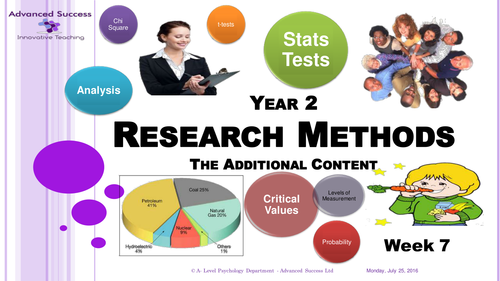
Since 2004 Nick and Bethan have worked with top independent and state schools to develop 'Outstanding' teaching and learning resources.
" Nick and Bethan your student workshop was fantastic pitched at the right level, we will definitely be using you again next year for both Year 12 and Year 13 - excellent resources" Inner London School.
This eagerly anticipated powerpoint has been produced by leading authors Nick and Bethan specifically for the AQA Psychology Specification Year 2 - Research Methods Additional Content and maps onto our VERY popular Student Workbook of the same name also available for download here on TES
Week 7 - Research Methods Additional Content - Learning Objectives
On completion of this unit you should be familiar with the following:
Lesson 1. Research methods
a. Content analysis, coding and Thematic analysis
b. Case studies.
Lesson 2. Scientific processes
a. Types of validity across all methods of investigation: face validity, concurrent validity, ecological validity and temporal validity. Assessment of validity. Improving validity.
b. Features of science: objectivity and the empirical method; replicability and falsifiability; theory construction and hypothesis testing; paradigms and paradigm shifts.
c. Reporting psychological investigations. Sections of a scientific report: abstract, introduction, method, results, discussion and referencing.
Lesson 3. Data handling and analysis
a. Analysis and interpretation of correlation, including correlation coefficients.
b. Levels of measurement: nominal, ordinal and interval (covered in 4b).
c. Content analysis and coding. Thematic analysis (covered in 1a).
Lesson 4. Inferential testing
a. Probability and significance: Type I and Type II errors
b. Factors affecting the choice of statistical test, including level of measurement: nominal, ordinal and interval data and experimental design. When to use the following tests: Spearman’s rho, Pearson’s r, Wilcoxon, Mann-Whitney, related t-test, unrelated t-test and Chi-Squared test.
c. The use of statistical tables and critical values in interpretation of significance;
d. Introduction to statistical testing; the sign test. Including the mathematical criteria the calculation of non-parametric tests.
Fully mapped onto the NEW Specification and SOW and has been fully crossed reference with question papers and mark schemes from Spec A, B and the New STEM. In addition includes material and terms mentioned in the SOW but not included in most 'endorsed textbooks' DOWNLOAD sit back and LIVE LIFE.
Our workbooks are also be supported by our Unique LIVE ONLINE ACADEMY (Psychexamhelp) and LIVE Online Course for more information go to our website at the right hand side of the page or contact Nick and Bethan information@advancedsuccess.co.uk
" Nick and Bethan your student workshop was fantastic pitched at the right level, we will definitely be using you again next year for both Year 12 and Year 13 - excellent resources" Inner London School.
This eagerly anticipated powerpoint has been produced by leading authors Nick and Bethan specifically for the AQA Psychology Specification Year 2 - Research Methods Additional Content and maps onto our VERY popular Student Workbook of the same name also available for download here on TES
Week 7 - Research Methods Additional Content - Learning Objectives
On completion of this unit you should be familiar with the following:
Lesson 1. Research methods
a. Content analysis, coding and Thematic analysis
b. Case studies.
Lesson 2. Scientific processes
a. Types of validity across all methods of investigation: face validity, concurrent validity, ecological validity and temporal validity. Assessment of validity. Improving validity.
b. Features of science: objectivity and the empirical method; replicability and falsifiability; theory construction and hypothesis testing; paradigms and paradigm shifts.
c. Reporting psychological investigations. Sections of a scientific report: abstract, introduction, method, results, discussion and referencing.
Lesson 3. Data handling and analysis
a. Analysis and interpretation of correlation, including correlation coefficients.
b. Levels of measurement: nominal, ordinal and interval (covered in 4b).
c. Content analysis and coding. Thematic analysis (covered in 1a).
Lesson 4. Inferential testing
a. Probability and significance: Type I and Type II errors
b. Factors affecting the choice of statistical test, including level of measurement: nominal, ordinal and interval data and experimental design. When to use the following tests: Spearman’s rho, Pearson’s r, Wilcoxon, Mann-Whitney, related t-test, unrelated t-test and Chi-Squared test.
c. The use of statistical tables and critical values in interpretation of significance;
d. Introduction to statistical testing; the sign test. Including the mathematical criteria the calculation of non-parametric tests.
Fully mapped onto the NEW Specification and SOW and has been fully crossed reference with question papers and mark schemes from Spec A, B and the New STEM. In addition includes material and terms mentioned in the SOW but not included in most 'endorsed textbooks' DOWNLOAD sit back and LIVE LIFE.
Our workbooks are also be supported by our Unique LIVE ONLINE ACADEMY (Psychexamhelp) and LIVE Online Course for more information go to our website at the right hand side of the page or contact Nick and Bethan information@advancedsuccess.co.uk
Something went wrong, please try again later.
Having started to use the Schizophrenia topic resources with my Year 13's (July 2016) I can feedback that students find them very user friendly as they are so clearly written and very easy to follow. Really pleased to see this Research Methods Additional Content is also clearly explained and laid out and the accompanying activities work for all my ability students - A through to E ! A BIG thank you.
Report this resourceto let us know if it violates our terms and conditions.
Our customer service team will review your report and will be in touch.
£10.00
